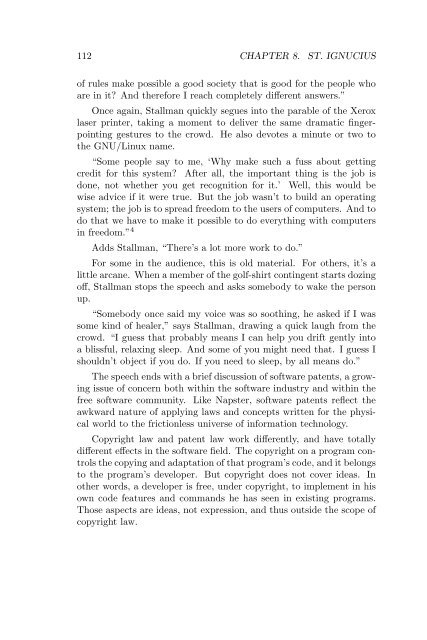You also want an ePaper? Increase the reach of your titles
YUMPU automatically turns print PDFs into web optimized ePapers that Google loves.
112 CHAPTER 8. ST. IGNUCIUS<br />
of rules make possible a good society that is good for the people who<br />
are in it? And therefore I reach completely different answers.”<br />
Once again, Stallman quickly segues into the parable of the Xerox<br />
laser printer, taking a moment to deliver the same dramatic fingerpointing<br />
gestures to the crowd. He also devotes a minute or two to<br />
the GNU/Linux name.<br />
“Some people say to me, ‘Why make such a fuss about getting<br />
credit for this system? After all, the important thing is the job is<br />
done, not whether you get recognition for it.’ Well, this would be<br />
wise advice if it were true. But the job wasn’t to build an operating<br />
system; the job is to spread freedom to the users of computers. And to<br />
do that we have to make it possible to do everything with computers<br />
in freedom.” 4<br />
Adds Stallman, “There’s a lot more work to do.”<br />
For some in the audience, this is old material. For others, it’s a<br />
little arcane. When a member of the golf-shirt contingent starts dozing<br />
off, Stallman stops the speech and asks somebody to wake the person<br />
up.<br />
“Somebody once said my voice was so soothing, he asked if I was<br />
some kind of healer,” says Stallman, drawing a quick laugh from the<br />
crowd. “I guess that probably means I can help you drift gently into<br />
a blissful, relaxing sleep. And some of you might need that. I guess I<br />
shouldn’t object if you do. If you need to sleep, by all means do.”<br />
The speech ends with a brief discussion of software patents, a growing<br />
issue of concern both within the software industry and within the<br />
free software community. Like Napster, software patents reflect the<br />
awkward nature of applying laws and concepts written for the physical<br />
world to the frictionless universe of information technology.<br />
Copyright law and patent law work differently, and have totally<br />
different effects in the software field. The copyright on a program controls<br />
the copying and adaptation of that program’s code, and it belongs<br />
to the program’s developer. But copyright does not cover ideas. In<br />
other words, a developer is free, under copyright, to implement in his<br />
own code features and commands he has seen in existing programs.<br />
Those aspects are ideas, not expression, and thus outside the scope of<br />
copyright law.


